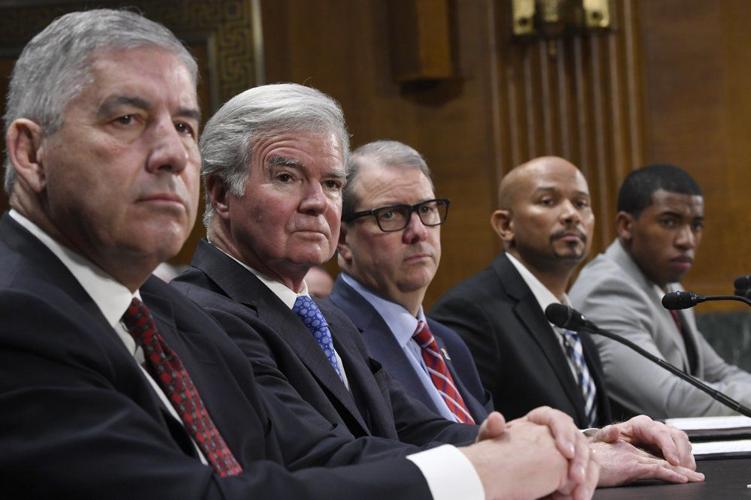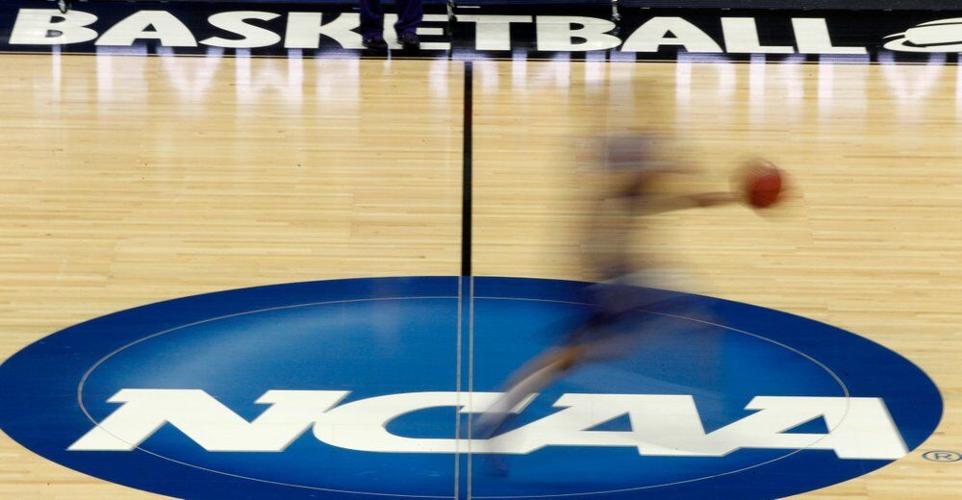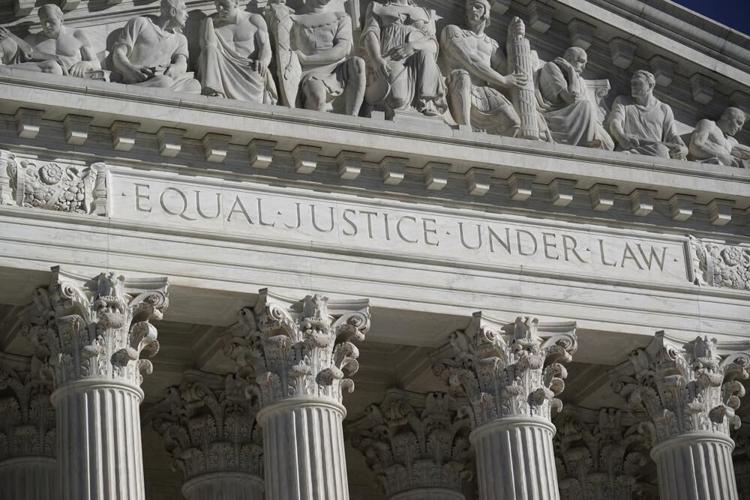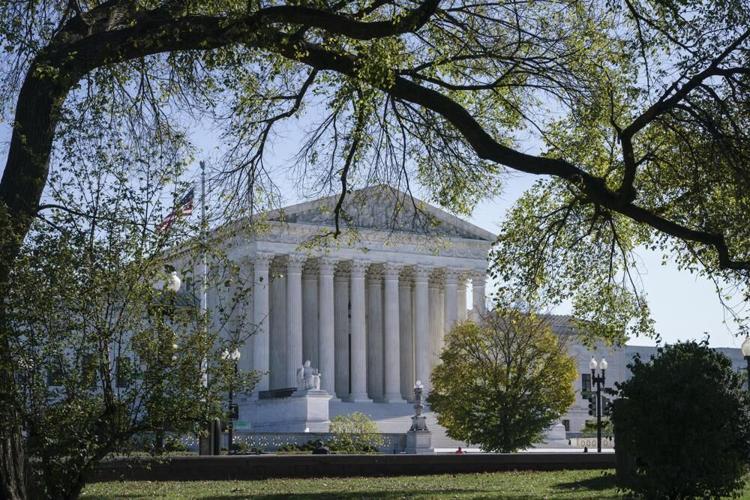LOUISVILLE, Ky. (WDRB) – Picture the NCAA as a large, slow-moving ship. That shouldn’t be difficult. The U.S. Supreme Court didn’t exactly play the part of the iceberg in the ruling it issued on Monday morning – but it displayed iceberg-like qualities.
In a unanimous decision, the Supreme Court ruled that the NCAA and its schools and conferences were in violation of the Sherman Antitrust Act in agreeing to limit how much athletes could be compensated for academic expenses.
Forget the “academic expense” part of this. The most important part of this ruling is the court’s decision to hold the NCAA to the kind of free-market scrutiny applied to other American industries. More on that in a moment.
It’s important to note what the ruling did not do. It did not take away the NCAA’s power to make its own rules. It did not address athletics compensation, or anything other than academic expenses. It did not touch on name, image and likeness issues. It even allows the NCAA the right to define “academic expenses.”
And yet, it is against the backdrop of all those issues that this ruling falls, and it touches all of them because of the court’s willingness to revisit the NCAA’s standing with regard to antitrust law.
It is perhaps the largest tremor yet in a landscape that is shaking under the NCAA’s feet.
For years, the NCAA had successfully argued that as a voluntary association of colleges and universities it should get a good bit of leeway under federal antitrust law. Monday’s ruling put a new precedent in place. And that may well leave the NCAA exposed when future legal challenges come.
In reality, the ruling all but demands that the NCAA change its ways – and in some cases its rules. And it invites further challenges to the NCAA’s business model, which are sure to come, and perhaps soon.
What has changed? Plenty, according to Justice Neil Gorsuch. Mainly, it’s the money involved. Over the past 40 years, college sports became big business and began operating like big business, in every way but one. Free markets abound in college sports – for coaches, administrators, conference officials, even referees – but they do not exist for players.
Writing for the court, Gorsuch stated that it’s getting tougher to come up with any good or fair (or legal) reason to keep the athletes out of that mix.
“At the center of this thicket of associations and rules sits a massive business,” Gorsuch writes, then goes on to point out, “. . . Those who run this enterprise profit in a different way than the student-athletes whose activities they oversee. The president of the NCAA earns nearly $4 million per year. Commissioners of the top conferences take home between $2 to $5 million.”
Gorsuch mentioned the salaries of athletics directors and coaches, then noted that the bedrock NCAA principle of “amateurism” is an idea that has changed with the times, and which is not well-defined by the NCAA.
As I write this, baseball players are competing at the College World Series in Omaha, Neb. Most of the teams have at least 35 players, sharing an NCAA-mandated 11.7 scholarships. Their coaches make high six-figure salaries, but the players, to a large degree, pay their own way.
Increasingly, the courts and the congress are not comfortable with that kind of disparity.
That’s particularly significant considering that, in congress, debate continues on a national law governing how college athletes may benefit from the sale of their name, image and likeness. In exchange for a national law, the NCAA reportedly is seeking some “safe harbor” from NIL lawsuits and an antitrust exemption from lawmakers.
That exemption was unlikely to happen at any point, according to Michael McCann, legal analyst for Sportico.com, and an attorney who is a Professor Law at New Hampshire University, but even less so after this ruling.
“I’m very skeptical that congress is going to support an antitrust exemption for the NCAA and its member schools,” McCann said Monday. “First of all, look at it this way. Why? Why exempt any entity from antitrust law. We just saw the Supreme Court say, 9-0, what the NCAA is doing violates antitrust law. Why give them something? If anything, maybe they should be held to greater scrutiny.”
So what happens next? We wait to see what the NCAA hammers out on name, image and likeness. Six states have laws go into effect on July 1 that will allow players to benefit from their name, image and likeness. Many more have laws going into effect in the coming months.
Last week, NCAA president Mark Emmert sent a memo to schools demanding a national policy by July 1, and indicated that if they did not pass rules to govern colleges around the nation, he would take action.
In the short term, Monday’s ruling doesn’t mean significant change for athlete compensation now.
At the University of Louisville, Vince Tyra has been proactive where educating athletes on NIL issues is concerned. He believes that issue will be settled soon. He also believes that Louisville is well-positioned for what is coming. In fact, the school already has been allowing athletes to draw enhanced academic benefits since the result of the original court ruling in this case last year.
“Louisville has been advancing its financial support of our student athletes at an increasing rate and today’s Supreme Court ruling fosters even greater support tethered to educational benefits,” Tyra said in a statement provided to WDRB. “We will now await some further clarification from the NCAA and move as quickly as possible on behalf of our student athletes.”
In the meantime, the NCAA can likely expect an uptick in lawsuits filed by athletes seeking to test how far the courts will go in granting them concessions.
A concurring opinion by Justice Brett Cavanaugh suggests that some on the court may be ready to scrap the NCAA’s entire amateur model. His separate opinion does not carry the weight of precedent, but it does convey the weight of his own sentiment and should be a warning to the NCAA.
“The NCAA couches its arguments for not paying student athletes in innocuous labels,” he writes. “But the labels cannot disguise the reality: The NCAA’s business model would be flatly illegal in almost any other industry in America. All of the restaurants in a region cannot come together to cut cooks’ wages on the theory that ‘customers prefer’ to eat food from low-paid cooks. Law firms cannot conspire to cabin lawyers’ salaries in the name of providing legal services out of a ‘love of the law.’ Hospitals cannot agree to cap nurses’ income in order to create a ‘purer’ form of helping the sick. News organizations cannot join forces to curtail pay to reporters to preserve a ‘tradition’ of public-minded journalism. Movie studios cannot collude to slash benefits to camera crews to kindle a ‘spirit of amateurism’ in Hollywood.”
Those are strong and unambiguous words, as are these, which follow them, from Kavanaugh: “Price-fixing labor is price-fixing labor. And price-fixing labor is ordinarily a textbook antitrust problem because it extinguishes the free market in which individuals can otherwise obtain fair compensation for their work.”
The real message of Monday’s ruling is that the antitrust exemption the NCAA has hid behind for 35 years has been chain-sawed away. Whether the tree falls or dies by a thousand cuts, the first axe blow has been struck.
College sports are a cherished tradition in this country. Kavanaugh acknowledges as much in his concurring opinion. The football Saturdays in South Bend and Tuscaloosa. March Madness. The College World Series going on right now.
“But those traditions alone cannot justify the NCAA’s decision to build a massive money-raising enterprise on the backs of student athletes who are not fairly compensated,” he concludes. “Nowhere else in America can businesses get away with agreeing not to pay their workers a fair market rate on the theory that their product is defined by not paying their workers a fair market rate. And under ordinary principles of antitrust law, it is not evident why college sports should be any different. The NCAA is not above the law.”
A 9-0 scoreboard. And seven words that should drive home the message louder than ever for the NCAA – change now, or change will overtake you.
Copyright 2021 WDRB Media. All Rights Reserved.








